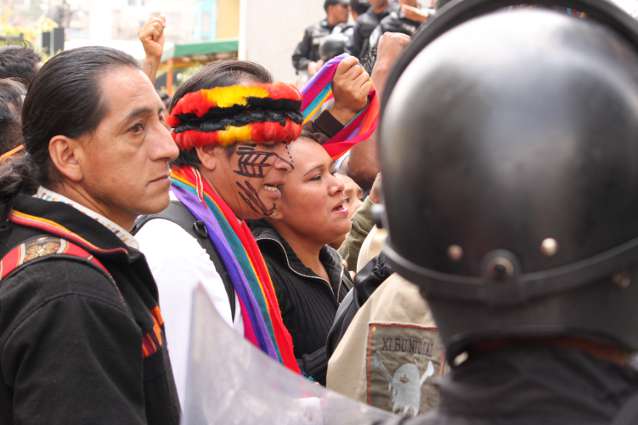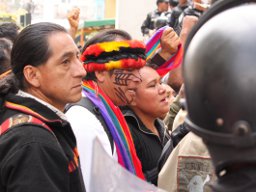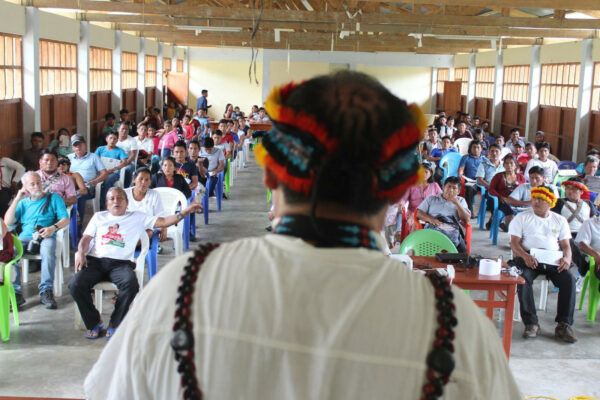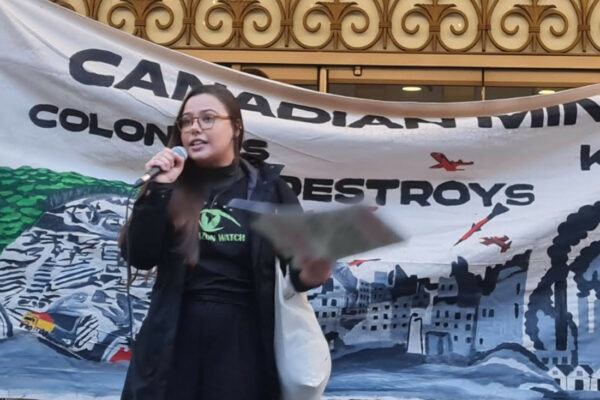
Yesterday, I blogged about a number of reasons indigenous peoples are a leading force in the movement to achieve balance and harmony in human society’s relationship with the environment. An important example of Amazonian indigenous leadership with respect to the environment is its contribution to the Rights of Nature movement.
In 2008, Ecuador adopted a new constitution that includes a chapter specifically devoted to the Rights of Nature and that establishes as a principle of law that “Nature or Pachamama, where life is reproduced and exists, has the right to exist, persist, maintain itself and regenerate its own vital cycles, structures, functions and evolutionary processes.” The Ecuadorian constitution also gives nature “the right to be completely restored.” Under the Constitution’s Rights of Nature chapter, the government of Ecuador is obligated to take action to ensure the protection of these rights and the Ecuadorian people are given the right to benefit from the environment. These provisions give legal expression to the indigenous understanding of Pachamama as a living entity in itself that also embraces all living beings, all of whom manifest the same dignity and command the same rights as human beings intuitively recognize themselves to possess.
Ecuador’s triumphant expansion of rights to include Pachamama was followed in January 2010 by Bolivia, which passed the world’s first law granting nature equal rights with humans. In April that same year, Bolivia hosted the World People’s Conference on Climate Change and the Rights of Mother Earth. The highlight achievement of this conference was the adoption of a “Universal Declaration of the Rights of Mother Earth.” Bolivia then submitted the Declaration to the United Nations with the hope that it will be adopted as a companion to the United Nations’ Universal Declaration of Human Rights.
These new laws and declarations reflect the sophisticated eco-centric worldview of the indigenous communities who have lived in harmony with nature within the Amazonian rainforest for thousands of years and who have also witnessed and suffered first-hand the ruinous consequences of avaricious resource extraction by colossal multi-national corporations.
At the same time that these examples of indigenous leadership give cause to all human beings to celebrate our expanding enlightenment, they also challenge us to ask ourselves: If nature’s rights must be recognized and defended, what about the rights of the indigenous?
Human beings living in non-indigenous societal structures have a long history of regarding themselves as separate and above nature. Unfortunately, even when it comes to environmentalist strategies to protect nature, this tendency to elevate the status of human beings above nature often translates into a blindness toward an aspect of nature journalists Mark London and Brian Kelly call “the forgotten animal in the environment – human beings.”
In effect, we will save the jaguar and the rainforest because we love animals and understand the importance of biodiversity and the role of the rainforest in the planet’s climate systems, but we do not find any persuasive motive to protect the rights of indigenous peoples to maintain their millennia-old way of life in their ancestral homeland. We fail to understand that biodiversity is a concept that applies powerfully to human beings’ different ways of life in promoting the health of both our species and the community of life on our planet. We neglect to recognize the vitally important role indigenous peoples play in the planetary and rainforest ecosystems.
Let me give you two examples of the way the rights of indigenous peoples are being trampled by leaders in the environmental movement.
The first example involves the REDD (Reducing Emissions from Deforestation and forest Degradation) movement, which attempts to protect rainforests and respond to climate change by creating financial value for the carbon being stored in standing forests as an alternative to cutting forests down. A great number of parties, including the United Nations Committee on the Elimination of Racial Discrimination, have criticized REDD for placing the rights of indigenous communities at risk in the way that it defines what constitutes deforestation and degradation, in the way that it creates unintentional reverse incentives for polluters and loggers, in the way that it omits to recognize indigenous rights, and in the way that it has failed to involve indigenous peoples in REDD policy discussions and negotiations.
The second example sadly comes from Bolivia, the very government championing the Universal Declaration of the Rights of Mother Earth. Bolivia has recently drawn international criticism for violently suppressing the protests of indigenous communities opposed to the construction of a national highway through indigenous owned lands in the Isiboro Secure National Park and Indigenous Territories (TIPNIS) rainforest. In the midst of a 400-mile march from their home to their nation’s capital, roughly 1000 men, women and children were attacked at a night’s encampment by police wearing full battle gear shooting tear-gas canisters directly at them. Their leaders were beaten and hundreds were seized and herded onto busses headed for unknown destinations. Video taken at the scene caught police knocking women down and forcibly taping their mouths shut. The violence continued into the next day.
Ultimately, the domestic and international outcry over the government’s actions resulted in the resignation of a number of key government officials and the suspension of financing for the highway by Brazil’s National Development Bank (BNDES). As noted in an earlier Eye on the Amazon post, Bolivia’s former ambassador to the United Nations, Pablo Solón, issued an open letter to Bolivia’s president reminding him and the nation that Bolivia’s position on the rights of nature included obligations to respect the rights of indigenous peoples.
These grave examples of blindness toward indigenous rights among leaders in the environmental movement are also a useful measure of just how sophisticated is the vision at Amazon Watch, which makes solidarity with indigenous peoples the foundation of all its activism. Part III of this series will illustrate the work Amazon Watch is doing to steer Bolivia and the REDD movement toward recognition and advancement of indigenous rights.
Read Part III of this series »














